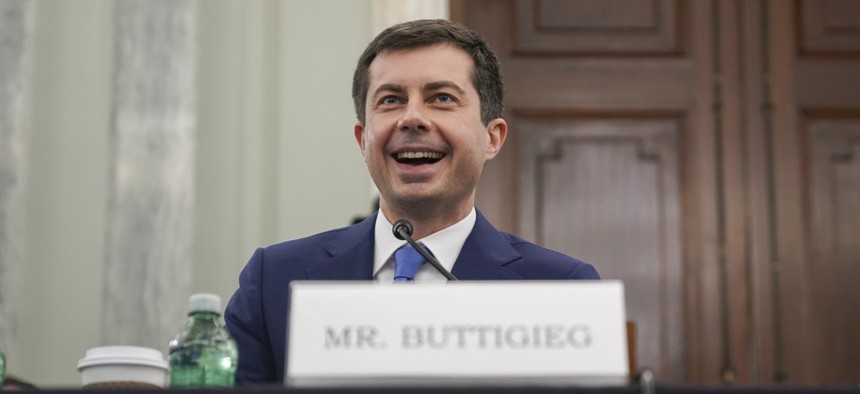Buttigieg Emphasizes He’ll Bring Local Perspective to Top Transportation Job

Transportation Secretary nominee Pete Buttigieg smiles during a Senate Commerce, Science and Transportation Committee confirmation hearing on Capitol Hill, Thursday, Jan. 21, 2021, in Washington. Stefani Reynolds/Pool via AP
Transportation secretary nominee Pete Buttigieg, a former mayor, received a favorable hearing before the Senate committee considering his nomination.
The Transportation Department must do more to support local governments as they seek infrastructure grants for projects, transportation secretary nominee Pete Buttigieg told senators during his confirmation hearing on Thursday.
Buttigieg, the former mayor of South Bend, Indiana, said the department can play a “central role” in rebuilding America’s economy as it recovers from the Covid-19 pandemic and that he would bring a "bottom-up perspective on transportation programs and funding” to the job.
Improving grant and funding processes could include better communication with local governments on how to engage, particularly smaller communities that may not have dedicated federal liaisons, or offering technical assistance to grant recipients, Buttigeig told the Senate Committee on Commerce, Science, and Transportation.
“It is very important to me to make sure that this process is user-friendly, that criteria are transparent, and communities of every size, including rural communities and small communities, have every opportunity to access those funds,” he said.
Buttigieg appeared to be on an easy path to confirmation, drawing praise from senators on both sides of the aisle during the hearing as well as multiple invitations to visit lawmakers’ home states. The former Democratic presidential candidate would be the first openly gay person confirmed by the Senate to a Cabinet post.
Republicans sought to draw on Buttigieg’s experience as a local elected leader who has navigated federal bureaucracy in order to exact promises that he’d try to reduce regulatory hurdles for transportation infrastructure projects. Buttigeig said understood the frustration of seeing projects delayed as a result of regulatory activities and that he’d look for ways to reduce duplicative processes without cutting corners on safety or environmental standards.
“As mayor, I saw how rules and regulations can add to the time or expense of the project,” he said. “Those rules are there for a reason, but if we can meet that same reason with less of a burden then we should do it.”
The Department of Transportation distributes billions of dollars in federal highway and transportation funding. The DOT will also be tasked with carrying out President Biden’s clean energy promise to install 500,000 electric vehicle charging stations along highways across the country.
Buttigieg told lawmakers that funding for local transportation infrastructure projects, including through BUILD and INFRA grants, will require “a major investment.”
While federal lawmakers generally agree that more must be done to repair and maintain the nation’s aging transportation infrastructure, Democrats and Republicans have struggled to reach a consensus on how to raise new funding for public works. As vehicles become more fuel efficient, less federal gas tax revenue is collected and deposited in the Highway Trust Fund, a major source of funding for roads and transit.
Lawmakers quizzed Buttigieg over how he would fund transportation projects. Sen. Rick Scott, a Florida Republican, asked whether he would support an increase of the federal gas tax.
Buttigieg would not rule it out but said raising the gas tax would not be a sustainable solution in the long run. He added that user fees based on vehicle miles traveled should also be discussed.
“All options have to be on the table,” Buttigieg said.
Andrea Noble is a staff correspondent with Route Fifty.
NEXT STORY: Trump’s last-day order clamps down on foreign access to US-based IaaS





